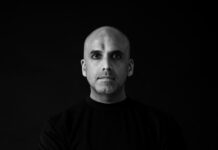
Transcript: Sebastian Weiß, Picture: Ben Gibbs
A German translation of this article can be found in Groove 154 (May/June 2015)
How does a piece of music come into existence? What was the initial idea and how much does this idea change during the process of recording? In our „Making Of“ series musicians and producers tell the story of one of their tracks in their own words. This time, John Frusciante gives his account of how he made „After Below“ off his acid house album under the moniker of Trickfinger.
„I had a strong vision of myself making electronic music in 1997 just before I rejoined my old band [Red Hot Chili Peppers, ed.]. I had always seen all music made with electric instruments, and all recorded music, as electronic music. But I had never imagined myself being someone who would make synth pop or hip hop or dance/club music.During the 80s I rarely was very excited about music made with synths, samples, and drum machines. When all the really great techno and jungle emerged in the 90s, I did not even know it existed. But when my 90s drug addiction period came to an end, I became obsessed with so-called electronic music. All of a sudden I loved 80s synth pop and industrial music, and thought my songwriting would sound good produced like that, but I had little money, and thought that this was very expensive music to make. I rejoined my old band, and gradually started buying synths, samplers and drum machines. I soon discovered different kinds of house music, techno, jungle, and labels like Rephlex, Warp, React and XL. I also discovered electronic noise music and labels like Staubgold, Mille Plateaux and Mego.
„The idea that a musician isn’t qualified to be an engineer was just standard rock ignorance.“
I gradually realized, over the course of about eight years, that the best machines for me were not the ones that professionals in the business had been recommending to me, and that you didn’t need big expensive studios or a staff of people to make good sounding electronic music. That was just standard rock ignorance, the idea that a musician isn’t qualified to be an engineer, and a home studio can never sound as good as a big studio. I knew this was wrong by 1999, but I had no idea how music like Autechre or AFX came into being. I had no friends who worked this way, and I had to spend a lot of time doing my professional work in my band. By the time I heard the Analord series in 2005, I was sure that the one man musician/engineer was superior in potential to the tired industry standard of the engineer and musician being two separate people. Those Analord records sounded every bit as good to me as Depeche Mode, and I became intent on unlearning everything I’d learned from our industries professional engineers.




